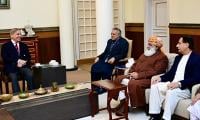rivals of Sir Syed mourned his death as if they had been orphaned.
While a part of me understands the contemporary feminist criticism of Sir Syed Ahmad Khan not being a proponent of women’s education as fervently as he was of education for men, I also think that people from the past must not be judged by today’s yardsticks. Appreciate the context and imagine the times. Sir Syed had no European schooling while Allama Iqbal who studied in the UK and Germany and was bamboozled by modern educated women of his time, from Attiya to Emma, was not clear about his views on the liberation and empowerment of women at all. But you can hold this against these men only to an extent in the larger context of history.
This would be like criticising one of the founding fathers of the United States, George Washington, for keeping African Americans as his serfs in the 18th century. No one can condone that and today many in the country he helped establish question his position on slavery. However, that does not take away his distinction of forming a nation. We also have to remind ourselves that it took the Americans another hundred years to abolish slavery and then another one hundred years to recognise the sons and daughters of slaves as equal citizens.
Likewise, had there been no Sir Syed and his movements, there would have been no foundations for enlightenment within the Muslims in the Subcontinent. In due time, this produced women and men who championed the rights of women to be educated and treated as equals. Subsequently, a dynamic women’s movement came about in our part of the world. Also, movements for the rights of minorities in today’s Pakistan where Muslims have become a majority can be associated with Sir Syed as a proponent of progressive thought and minorities’ rights in his time.
Sir Syed Ahmad Khan lived in Delhi, not only the heart of India but also the heart of Muslim India. Few now remember that it remained a Muslim-majority city encircled by a large Hindu-dominated region until Partition in 1947. Sir Syed closely witnessed the final fall of the Mughal Empire. He even wrote a pamphlet on the causes of the 1857 war which many among the new rulers did not particularly like.
There are three things that make Sir Syed important. The first is that his heart bled for his people and he wanted to lead them out of the quagmire in which they found themselves in the middle of the 19th century. This alone does not make him unique though. What does is that he understood the compulsions of the modern age. He had a finger on the pulse of his times, as they say. Lastly, Sir Syed accepted modernity on his own terms. He challenged conventional practices, beliefs and behaviour, and promoted enlightenment and scientific thinking while remaining within the history and culture of his community. He wanted to change them, not denounce them.
In a way, Quaid-e-Azam Mohammed Ali Jinnah took the same path. While being a liberal constitutionalist and a forward-looking man, he anchored himself in the history and culture of the Muslim community. After failing to secure a safe political space for them from the lopsided Congress leadership of his day, he led the process of creating a new state which in his view – sadly the view to be challenged by his own people soon after – had to be a modern, progressive and rational state where all citizens were to be equal.
I am reminded of Sir Syed Ahmad Khan today upon my return from Washington DC and during a brief layover in London on my way back home to Islamabad. The reason is simple. Within the Pakistani diaspora as well as people back home, I can see that a large part of our nation cannot understand what Ghalib saw and Sir Syed understood more than a century and a half ago.
These two men and their followers realised that the fountainhead of modern knowledge, science, art, politics and philosophy has moved to the west. It could have been Delhi, Damascus and Baghdad in the middle ages like it was Athens, Alexandria and Rome in even earlier times. But it is places like and around London, Berlin and New York where knowledge is generated and major decisions of contemporary human history are made. These decisions affect humanity in no uncertain ways.
While there were Chinese, Indian, Greek and Persian civilisations, or western and eastern civilisations, there is something universal called the human civilisation. Its epicentres shift from time to time owing to a host of political, economic and cultural conditions. But the universal human civilisation itself remains shared. Within the human civilisation, though, nations do not survive forever. Some perish quickly and some others remain in the folds of misery and self-deceit for long before they eventually perish. It seems that today we fall in the latter category of nations. If we do not want to live miserably and then finally perish, we need to seriously learn from societies that are ahead of us.
All achievements of human civilisation apart, there is no denying that the world remains a competitive and unjust place. But a downtrodden nation cannot achieve dignity by demonstrating mere rage against those who dominate it, while at the same time remaining dependent on them economically and technologically. The epicentres of knowledge and power may or may not be reclaimed by us in the times to come but the acquisition of knowledge and pursuit for intellectual liberation will make us eligible for a respectable and equal global citizenship.
The writer is a poet and author based in Islamabad.Email: harris.khalique@gmail.com
Many people believe that in future, AI will play an even more significant role in their lives
In April 2024, three Chinese and one Belarusian company were sanctioned for exporting missile-enabling technology to...
Pakistan has second highest neonatal mortality in world; in education sector, country's 26 million kids are out of...
Key actors in global power politics are US, China, Russia, European Union, and emerging powers such as India and Brazil
Maulana Fazl manages to bring together factions that historically stand opposed
NASA says August 2024 set new monthly temperature record, capping Earth’s hottest summer since 1880







